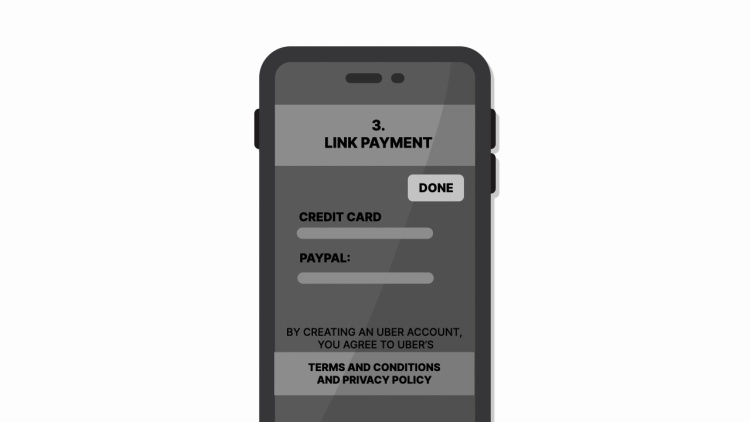Kauders v. Uber Technologies, Inc.
Massachusetts Supreme Judicial Court
486 Mass. 557, 159 N.E.3d 1033 (2021)
- Written by Abby Roughton, JD
Facts
Christopher Kauders (plaintiff) was blind and used a guide dog. In June 2014, Kauders used a mobile telephone to register with Uber Technologies, Inc. (Uber) (defendant) through Uber’s app. The registration was a three-step process, each involving a separate screen. First, the “CREATE AN ACCOUNT” screen required users to enter an email address, mobile telephone number, and password. Second, the “CREATE A PROFILE” screen required users to enter a first and last name and gave the option to upload a photograph. Third, the “LINK PAYMENT” screen required users to enter credit-card information or link a PayPal account. Once the user entered the information, a “DONE” button became clickable in the top right corner of the screen. Clicking the “DONE” button completed the registration process. At the bottom of the “LINK PAYMENT” screen, in text that was equally or less prominent than other words on the screen, users were informed that by creating an Uber account, the user agreed to Uber’s terms and conditions and privacy policy. The words “Terms & Conditions and Privacy Policy” appeared in a clickable rectangular box. Users who clicked the box would see a screen with further buttons to click through to Uber’s terms and conditions and privacy policy. If users clicked the terms-and-conditions link, the terms and conditions appeared on the screen. Among other things, the terms and conditions purported to release Uber from all liability for any type of damages or losses. The terms and conditions also contained a dispute-resolution clause providing that any dispute relating to a user’s agreement with Uber would be settled by binding arbitration. After Kauders registered with Uber, multiple Uber drivers allegedly refused to transport Kauders because of Kauders’s guide dog. Kauders and his wife sued Uber in Massachusetts state court, but Uber moved to compel arbitration based on the dispute-resolution provision in the terms and conditions. The trial court ultimately found that no enforceable contract requiring arbitration existed, and Uber appealed.
Rule of Law
Issue
Holding and Reasoning (Kafker, J.)
What to do next…
Here's why 910,000 law students have relied on our case briefs:
- Written by law professors and practitioners, not other law students. 47,100 briefs, keyed to 997 casebooks. Top-notch customer support.
- The right amount of information, includes the facts, issues, rule of law, holding and reasoning, and any concurrences and dissents.
- Access in your classes, works on your mobile and tablet. Massive library of related video lessons and high quality multiple-choice questions.
- Easy to use, uniform format for every case brief. Written in plain English, not in legalese. Our briefs summarize and simplify; they don’t just repeat the court’s language.





